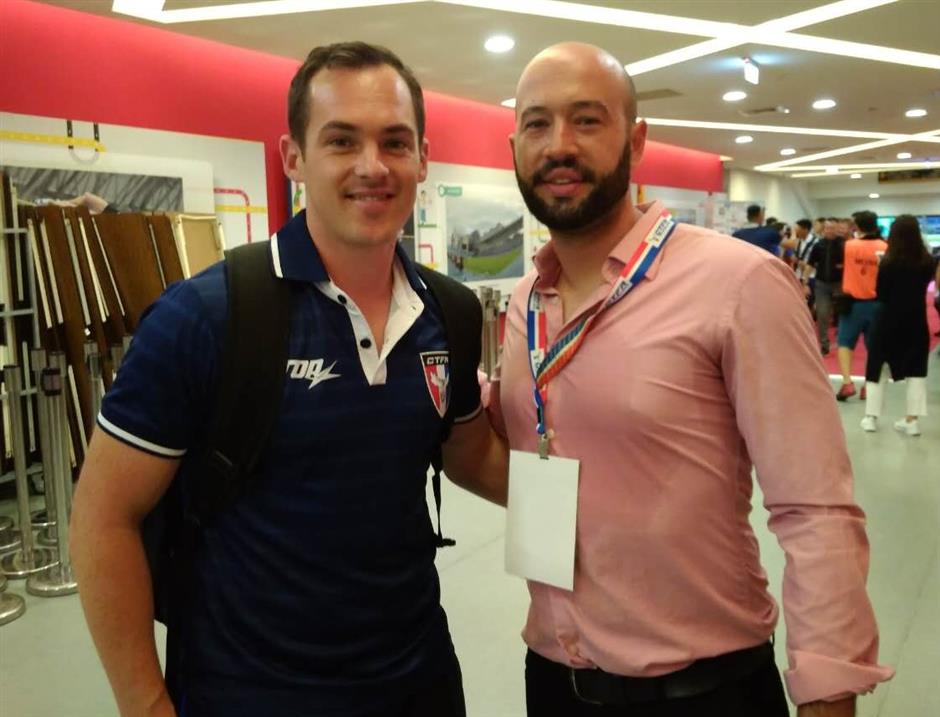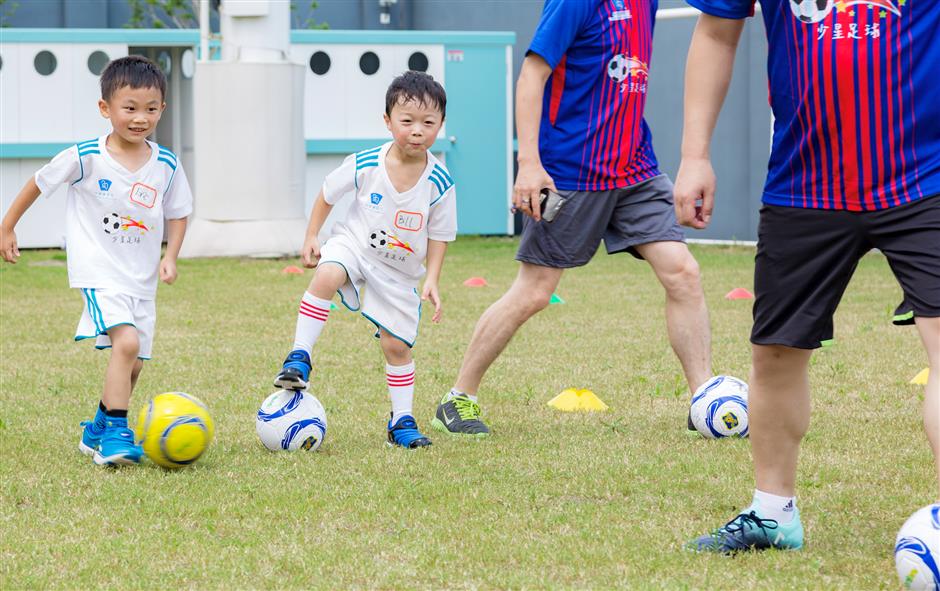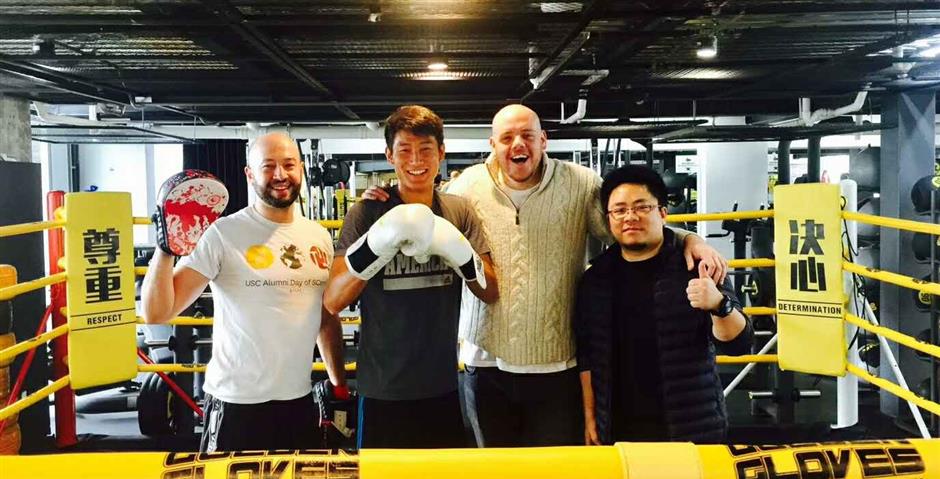Fulfilling the goal of China as a world 'soccer superpower'
When Harry Belford Spencer landed in Shanghai five years ago, he had no money, job or a plan for the future. Today, the Englishman owns Mr Harry, one of the most successful British restaurants in Shanghai, and is a managing director of First Pick Group — a sports services company.
Spencer describes himself as “thoughtful, relaxed and a good networker.” Thoughtful, as he spent two minutes coming up with three words; relaxed, referring to his state when he first came to Shanghai; and famous customers, who have dined at his restaurant, are a testament to a good networker. They include Rupert Hoogewerf, better known for his Chinese name Hu Run, chairman and chief researcher of Hurun Report or more widely known as the Hurun China Rich List, and Owen Patterson, who was at the time the UK government’s secretary of state for environment, food and rural affairs.
In 2013, Spencer saw a gap in the market and, with a friend and colleague, launched Shanghai’s first authentic British restaurant. Not long after, the London-born businessman added a sport’s agency to his impressive portfolio. It is an interesting transition, from restaurateur to soccer agent, but Spencer, a former banker, believes that the transition is as natural as opening a bistro.
“A couple of years after opening Mr Harry, I got a call from a football agent in the UK, whom I played bridge with, asking if I could help purchase a football club in England,” Spencer recalls. “And one of the greatest things a restaurant gave me is a good network. We found two Chinese investors who were interested within six weeks. Rupert Hoogewerf delivered one of them to me.”
Spencer initially found that most investors were more interested in transferring players than buying a club. He got requests like “Can you help access a Manchester United brand (player, or someone with a connection to the Red Devils) for my football school?” or “Can you help me find a famous basketball player who can come to Beijing for a car promotion?”
“Unlike the restaurant business, which is very mature and competitive here, the sport’s industry really lacks expertise,” the 33-year-old says. “You still get coaches and players who smoke. Something as simple as that is a big concern. A lot of young players look up to these people as they’re growing up.”

Harry Spencer (right) with Scott Pearce, former sports scientist at Sunderland AFC and now with Team Chinese Taipei
Chinese President Xi Jinping has ambitions to transform China into a “soccer superpower” by 2050, with plans to get 50 million children and adults playing the sport within two years. And because the football industry has developed at such an enormous pace over the last five years, alongside China’s economic status, there is little doubt that Xi’s vision will be fulfilled.
Financially speaking, China already surpasses some of the world’s leading football nations on some levels. Beijing Guoan’s Cedric Bakambu is the world’s most expensive player, while former England and Russia coach, Fabio Capello, earns a yearly salary of around 10 million euros (US$12.45 million) as manager of Jiangsu Suning.
“If you look at the money, a lot of it has gone into only a few things, such as China national team’s coach, who to my knowledge is the best-paid coach in the world,” Spencer says. “But how many players does he influence in China?”
In theory, the whole national team squad. Yet, most of the coaching is done at club level, and the China coach only spends maybe one to two months a year with his players.
On the other hand, what do the kids have? Do they have enough standard football pitches for them to play? Is the turf right for them?
Surely money given to superstar football players and managers would be better invested in employing grassroots-level coaches to develop the next crop of players in China.
“Take Gary White, ex-coach of Shanghai Shenxin as an example,” says Spencer. “He is now head coach at Chinese Taipei. He did a massive project in America, setting up youth training centers in Washington 15 years ago. And if you look at the development of American soccer, it’s much clearer to see how it has progressed during the course.
“So you’ve got a fantastic idea for China of where you want it to go and then you need to have people executing the plan. It’s all about bringing the right people at the right level.”
Spencer set up a football school called Star Coaching with his partner nine months ago, focusing on developing Shanghai’s young kids.
“In my opinion, the youngest players are probably the best in the world,” he says. “They are positive and very energetic.”

Young children train at Spencer’s football school Star Coaching.
The school starts from two and a half years old and goes up to 16 years old. But the main focus is on children in the 2-to-7 bracket because training has the biggest influence in their development.
Spencer has already witnessed the positive results and believes it can only get better.
“One big thing about football is that everyone is an individual, but without exception they’ve all developed dramatically in terms of their football skills and techniques” he says. “Young ones have developed in terms of focusing, physical movement and being able to listen and follow instructions.”
Younger kids are coached with their parents. Some 20 percent of children in the school are girls, but they train at the same level as boys do until they reach the age of 9.
The entry requirements for the 2-year-old are being able to follow instructions and move freely. The sessions undertake the same type of structure that a professional team would follow. Kids will warm up and then follow a series of skill exercises focusing on different areas and work toward a game scenario.
“We have coaches at pro-level,” Spencer says. “What we are trying to do is giving children a basic platform so when they start school around 7, they’d have some football skills.”
Toddlers probably know little about football, but they do know how to kick and scream very well. While they are bouncing around like kangaroos, running and kicking a ball, they are effectively developing all sorts of techniques and skills without realizing it.
“The thing is people treat football more like business rather than a sport,” Spencer says. “Instead of being based on fun, it’s more related to profit and money. We need to try and connect both sides in a way that will benefit the nation as opposed to a very few.”
All in all, Spencer is optimistic that China will become a world football superpower in the future — it’s only a matter of time. People need to use their knowledge not only to work with the top players, but also to let it filter through to the wider communities.
Football has become a global enterprise in the 21st century and it is difficult to separate the business side of the sport from the pleasure of playing. But, as Spencer concludes, if China could embrace the best of both worlds, it could become the new superpower of football in the future.

















